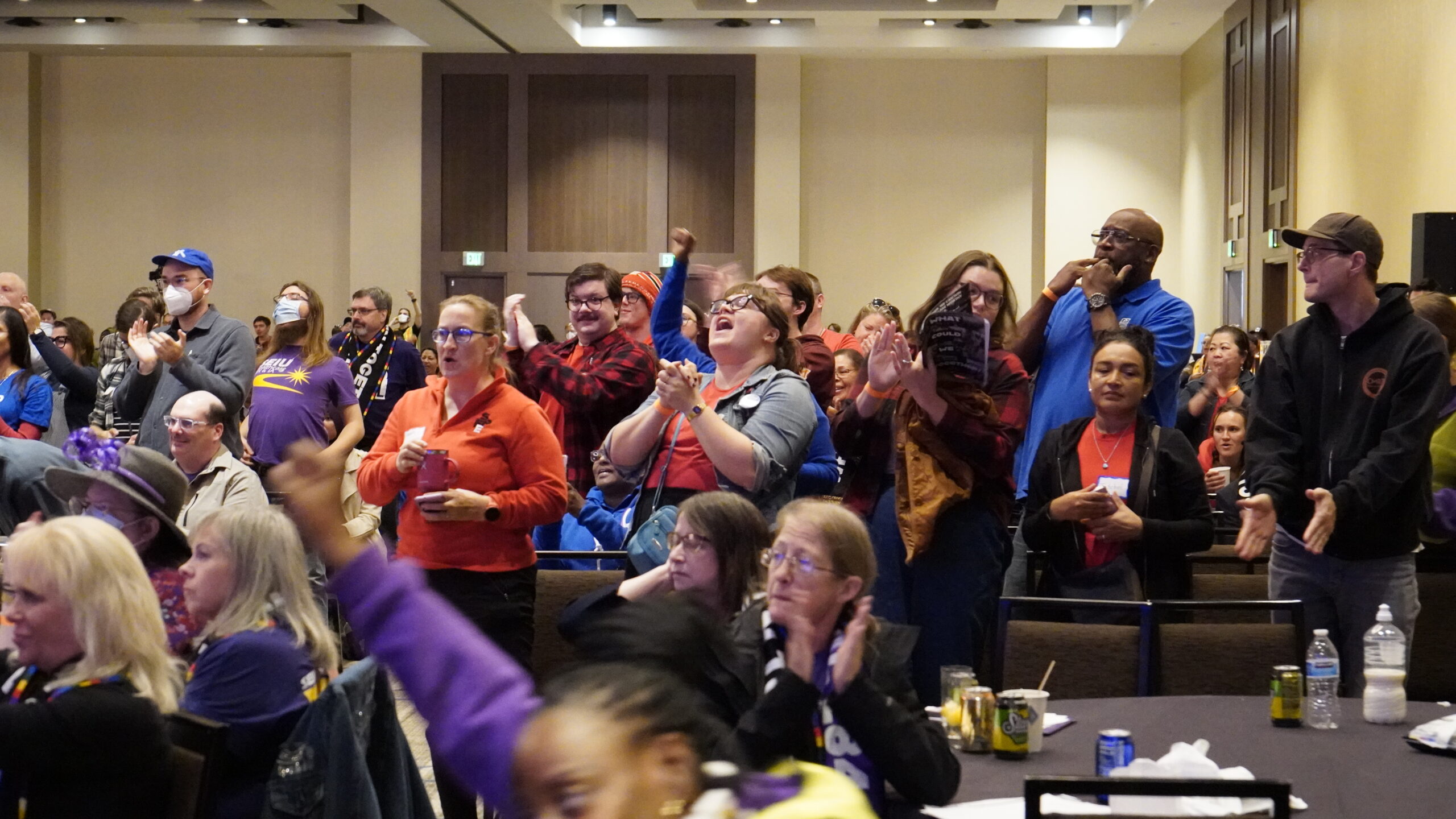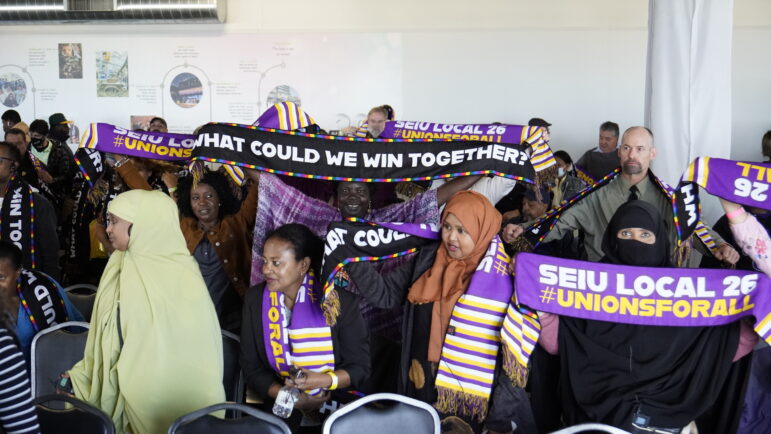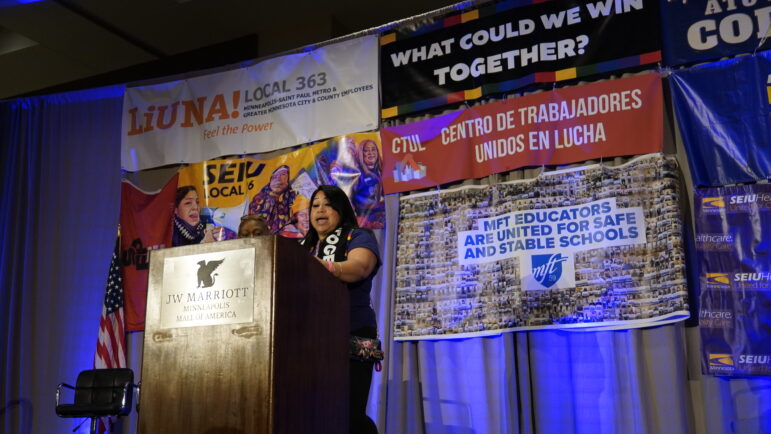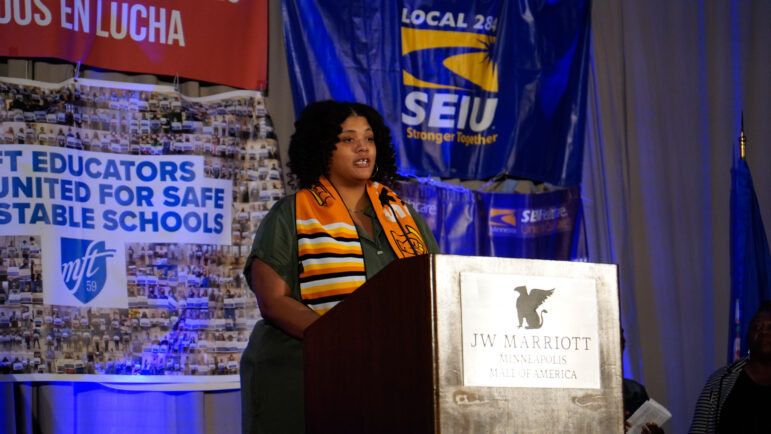
After a difficult few years, Minnesotan union members are celebrating wins, bringing energy to the labor movement to demand more. Credit: courtesy of Geoff Dittberner, SEIU Minnesota

Share
Minnesota unions have been planning for this moment for a decade.
Over the years they’ve meticulously coordinated their contracts to expire at the same time in order to maximize unity and bargaining power. Now, as these expiration dates are within sight, union organizers and rank-and-file members are beginning to prepare.
SEIU Local 26 has a contract expiring for 4,000 commercial janitorial workers on December 31. Their contracts for another 1,000 airport workers and 500 retail janitorial workers close on January 31, 2024. And the contract is up for 2,500 security workers on February 29, 2024.
In the world of public schools, the contracts for the St. Paul Federation of Educators (SPFE) Local 28, the Minneapolis Federation of Teachers (MFT) Local 59, and SEIU Local 284 (which represents support staff), already expired on June 30, but those contracts remain in effect until an agreement is put in place due to the Public Employment Labor Relations Act (PELRA).
The contract for the Amalgamated Transit Union (ATU) Local 1005 also expired over the summer, on July 31, but has been extended until a new contract is ratified. (The ATU is currently negotiating with the Metropolitan Council.)
Meanwhile, the Metro Transit bus and rail operators with the ATU and maintenance workers voted to authorize a strike in September. One of the ATU’s main demands is a cost of living adjustment plus 1%.
While the unions are organizing and bargaining separately, the shared expiration timeline was no accident. After decades of communication and coalition, many Minnesota unions have been eyeing opportunities like this in order to pool resources, strategize around bigger demands, and build a synergy they hope will lead to major gains.
In October, they took a big step forward. Thousands of workers from these unions — along with a smattering of community groups — gathered at the Marriott hotel inside the Mall of America in Bloomington, Minn., to strategize and reflect on what many believe will be a pivotal moment for labor in Minnesota. As they gathered, they centered the discussions around four tenets of a society where working people receive their fair share: dignified work, good schools, stable housing and a livable planet.
“Workers rights are being trampled on and our planet is being destroyed,” says Shanaz Padamsee from SPFE’s climate action committee who spoke about the vision for a liveable planet. “What would a different Minnesota look like for you, your family, your community?”
Members of the different unions and community organizations donned brightly colored scarves representing their different groups. There were so many people that they filled the halls and meeting rooms. At the beginning of the day, each group met individually to discuss everything ranging from the past year’s wins to upcoming contract expirations to efforts to text-blast city council members. They also engaged in political education and no small amount of chanting and singing.

Afterward, everyone came together and the main program, translated from English into Spanish and Somali, began with a raucous standing ovation from a crowd of thousands as members from the United Auto Workers (currently on a nationwide strike against General Motors and Stellantis after recently reaching a temporary agreement with Ford) were recognized for their efforts and a campaign that many say could have transformative effects for the entire working class.
“Where Minnesota goes, the United States will go too,” Brenda Johnson, a member with MFT, tells the energized crowd. Johnson grounded her speech by asserting Minnesota’s transformative place in global movements for justice, invoking the police killings of George Floyd, Philando Castile and Jamar Clark that led to unprecedented worldwide protest movements against racism, militarism and state violence.
It was also clear from the entire gathering that as various Minnesota unions look ahead to continuing contract expirations, all around the first few months of 2024, they are planning to ride the historic waves of worker organizing seen over the past few years since the pandemic. Speakers shared news headlines about the strikes by Starbucks Workers United, Writers Guild of America and Screen Actors Guild and the American Federation of Television and Radio Artists (SAG-AFTRA), SEIU United Healthcare Workers West at Kaiser Permanente and the Auto Workers’ Stand-Up Strike at the Big Three.
Workers and their unions are also celebrating and building momentum off of the past years’ legislative wins in Minnesota, including the announcement of a Minneapolis Labor Standards Board, the establishment of the nursing home workforce standards board, driver’s licenses for all, unemployment insurance for school workers, and free breakfast and lunch for students across the state.
Now they want to push even further.
The event signaled that the unions and community groups had core demands that centered around “dignified work” and included wages that keep up with inflation, the right to retire with a pension, safe working conditions, affordable healthcare, and reducing gender and racial pay gaps.
It was notable that they not only discussed working conditions and pay, but also demands that generally fall outside the scope of traditional bargaining, including environmental protections, affordable housing, and improving the quality of public education. Unions like the Chicago Teachers Union have used this strategy, known as bargaining for the common good, to not only improve their members’ working conditions, but also fight for structural change within their communities.
“We are the ones who make the Twin Cities work,” says Eva Lopez, vice president of SEIU Local 26’s retail division. Lopez used to clean the offices at the Mall of America where the venue for the event was held, now she’s organizing to improve conditions for workers like her. “Today we ask what could we win together? We will bring these demands together because we know all of our struggles are linked.”

Marcia Wyatt has worked in education for 30 years. She is a transition specialist in Minneapolis Public Schools and member of MFT who went on strike in 2022 over demands like higher pay for education support professionals and student mental health. “Some of the richest Minnesotans are working to weaken or eradicate public schools,” she says of corporate influence on education. “They are more concerned about their pockets and not concerned about their people.”
Padamsee says teachers are organizing for green technology, solarization and electric buses. Minnesotans have, like the rest of the planet, been experiencing the effects of climate change including record snowfall, drought, poor air quality, and temperatures so high that events like the Twin Cities marathon had to be canceled.
“As a union we’re taking steps to address climate change,” Padamsee says. “We know we cannot address this climate crisis alone. I am here today because we need each other. We all need to be in this fight to save our beautiful planet.”
The event was organized by SEIU Local 26, MFT, SPFE, SEIU Healthcare Minnesota & Iowa, ATU, Centro De Trabajadores Unidos En La Lucha (CTUL), Inquilinxs Unidxs por Justicia (IX), Minnesota Uber & Lyft Drivers Association (MULDA), Laborers International Union of North America (LIUNA) Local 363, Minnesota AFL-CIO, UNITE HERE Local 17, AFSCME Local 3800, Communication Workers of America (CWA) Local 7250 and more.
On the vision of dignified work, Douglas Guerra of CTUL spoke on behalf of non-union construction workers fighting wage theft and misclassification, and how CTUL had rallied in support of the formation of the Minneapolis Labor Standards Board. Marianna Brown, a member of MULDA, spoke about issues rideshare drivers face, including below- poverty wages, injuries without accountability from the rideshare company, violence, and car theft without recourse. “All of us know our work isn’t always valued or treated with dignity,” says Brown, noting that around 90% of drivers depend on their income from driving to make a living, debunking a long-standing myth that rideshare drivers are just supplementing their existing income. “Drivers are making very little money while big corporations are making fortunes,” said Brown. In the past year, Minnesota Gov. Tim Walz and Minneapolis Mayor Jacob Frey both vetoed protections for drivers after Uber and Lyft threatened to pull out of the state and city.
Members from IX (United Renters for Justice), a renters nonprofit in Minneapolis, told Workday Magazine and In These Times about the importance of affordable housing, their demand for increased funding for “social housing,” the need for additional protections for renters, and about their organizing efforts against neglectful and exploitative landlords and development companies that hurt workers and renters alike.

Arianna Anderson, a member of IX, spoke to Workday Magazine and In These Times about the experience of renting with HavenBrook Homes (Progress Residential became the property manager in June 2022). She alleges these corporate landlords “buy up homes in Black and brown communities,” and often neglect repairs while increasing home prices in low-income communities of color, making homeownership more difficult for locals. Anderson and her family experienced exactly this — after years of repair neglect that left their home uninhabitable, they were displaced from her home in North Minneapolis and forced to relocate to the suburbs.
Brianna Lofton, also a member of IX and standing alongside Anderson, emphasized the importance of linking the renters movement with the labor movement. “These people from these organizations have been exploited in some type of shape, way, or form,” Lofton says. “So instead of us being separate with our movements, bringing all the movements together [makes sense] to make a bigger impact.” Both Anderson and Lofton bonded over being displaced from Minneapolis to the greater Minnesota suburbs and the difficulty of the transition.
“An organized foe is never to be underestimated,” says Yolanda Roth of the progressive organizing hub TakeAction Minnesota, which is “organizing to change who decides and who benefits in our democracy and our economy,” according to their website. Roth was narrating an interactive performance about the current struggle for power in the state, a struggle being waged by working communities as resistance against increasing corporate and private power.
One powerful group discussed with disdain at the convention was the Minnesota Business Partnership (MNBP), which consists of executives from over 100 companies and multinational conglomerates headquartered in the state that receive tens of millions of dollars in tax breaks from the state of Minnesota.
The MNBP promotes policies leading to the reduction of state business property taxes, fewer income taxes, and state preemption of local government workforce mandates. They also champion increased funding for charter schools and additional standardized testing. General Mills, a consistent leader with the MNBP, raises money for schools with its “Box Tops for Education” program while lending financial support to charter schools. “Box Tops won’t cut it,” says Wyatt. “Families are buying off-brand products because it’s too expensive to buy your cereal just for a 10- cent label.”
MNBP and Progress Residential did not respond to requests for comment from In These Times and Workday Magazine.
Other Minnesota-based companies were also singled out during the convening because of their practices that participants at the event say harm workers and their communities. One was Ameriprise Financial, a wealth management company headquartered in downtown Minneapolis that manages working people’s savings for retirement through pension funds. The rise in subcontracting in the 1980s eliminated pensions for many janitors who work cleaning corporate offices. In 2022, CEO James Cracchiolo received more than $22 million in compensation, making him the highest paid CEO in Minnesota.
U.S. Bank is widely reported to have been partially responsible for the 2008 housing crisis, which many Black and brown working people never completely recovered from financially. U.S. Bank also is a longtime partner of Dominium, a housing developer and opponent of rent stabilization.
Also decried at the event was the manufacturer 3M Company, which has faced litigation for their role in disposing polyfluoroalkyl substances (PFAS), or “forever chemicals,” into environments across the country and polluting drinking water. The company reached an $850 million settlement with the state of Minnesota in 2018, and then this year reached a $10.3 billion settlement with water providers in cities across the United States. One of the things that was frustrating to people at the conference was that these payouts ultimately reduce the company’s tax bills as a business write-off.
“Corporations should pay their fair share of climate impacts,” says Padamsee. “No more getting away with destructive practices, and no more tax breaks for corporations paying lawsuits for the harm they inflicted.”
President Biden recently became the first sitting president to stand with striking workers on a picket line, so workers say they expect his administration to continue supporting pro-worker causes. Workers are also determined to hold on to the attention of leaders and the public as they continue bargaining with their employers. “We’re still in the fight of our life,” says Johnson, whose union is in bargaining right now with Minneapolis Public Schools. “We know that Biden stood not long ago with the workers, so we’re expecting he’s going to stand with us. They’re watching everything that we do, and we’re going to change the world.”
While it’s not yet clear what specific actions each union that attended this event is planning to take moving forward, or whether or not any will go on strike in 2024, workers are laying the groundwork for solidarity and mass action if contract negotiations do escalate, and part of their preparation includes fundraising now. This kind of cross-sectoral organizing is not common in the United States and workers in Minnesota are taking a bold and unique step toward building greater unity within the broader labor movement.
This article is a joint publication of In These Times and Workday Magazine, an independent, nonprofit magazine dedicated to advancing democracy and economic justice, informing movements for a more humane world, and providing an accessible forum for debate about the policies that shape our future.

